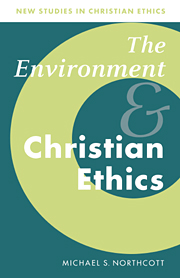Book contents
- Frontmatter
- Contents
- General editor's preface
- Preface
- Acknowledgements
- 1 Frogs, floods and famines
- 2 The origins of the environmental crisis
- 3 The turn to nature
- 4 The flowering of ecotheology
- 5 The order of creation
- 6 Creation, redemption and natural law ethics
- 7 Natural law and ecological society
- Notes
- Index
- New Studies in Christian Ethics
4 - The flowering of ecotheology
Published online by Cambridge University Press: 07 October 2009
- Frontmatter
- Contents
- General editor's preface
- Preface
- Acknowledgements
- 1 Frogs, floods and famines
- 2 The origins of the environmental crisis
- 3 The turn to nature
- 4 The flowering of ecotheology
- 5 The order of creation
- 6 Creation, redemption and natural law ethics
- 7 Natural law and ecological society
- Notes
- Index
- New Studies in Christian Ethics
Summary
The popular characterisation of Christianity as an anti-ecological religion is often exemplified in the putative weakness of the Christian response to environmental crisis. However, as I engaged with parts of the enormous literature arising from Christian reflections on environmental issues in preparing this book, it became clear to me that, both in its early origins – writings on the environmental crisis of modern civilisation by evangelicals such as Francis Schaeffer and Basilea Schlink date back to the late sixties – and in its size and ecumenicity, the Christian response is at least as significant as that which characterises the response of humanists, and of modern philosophers in particular, such as those reviewed in the last chapter. Like the philosophical response to environmental crisis, the Christian response is characterised by a range of polarities or antitheses, but these polarities do not simply coincide with those explored in the previous chapter, though there are points of similarity, particularly in relation to ecocentric approaches. I have therefore chosen three headings, humanocentric, theocentric and ecocentric, under which to attempt to characterise the various positions taken up by Christian theologians and ethicists writing on environmental themes. These positions it must be said are often less hard fought than those of the philosophers, and perhaps less hard won also. It will therefore be evident that a number of authors might at times be described as humanocentric, and at other times as theocentric, and even at times ecocentric. But the fluidity of the categories does not I hope detract too much from their heuristic and typological value.
- Type
- Chapter
- Information
- The Environment and Christian Ethics , pp. 124 - 163Publisher: Cambridge University PressPrint publication year: 1996
- 1
- Cited by

